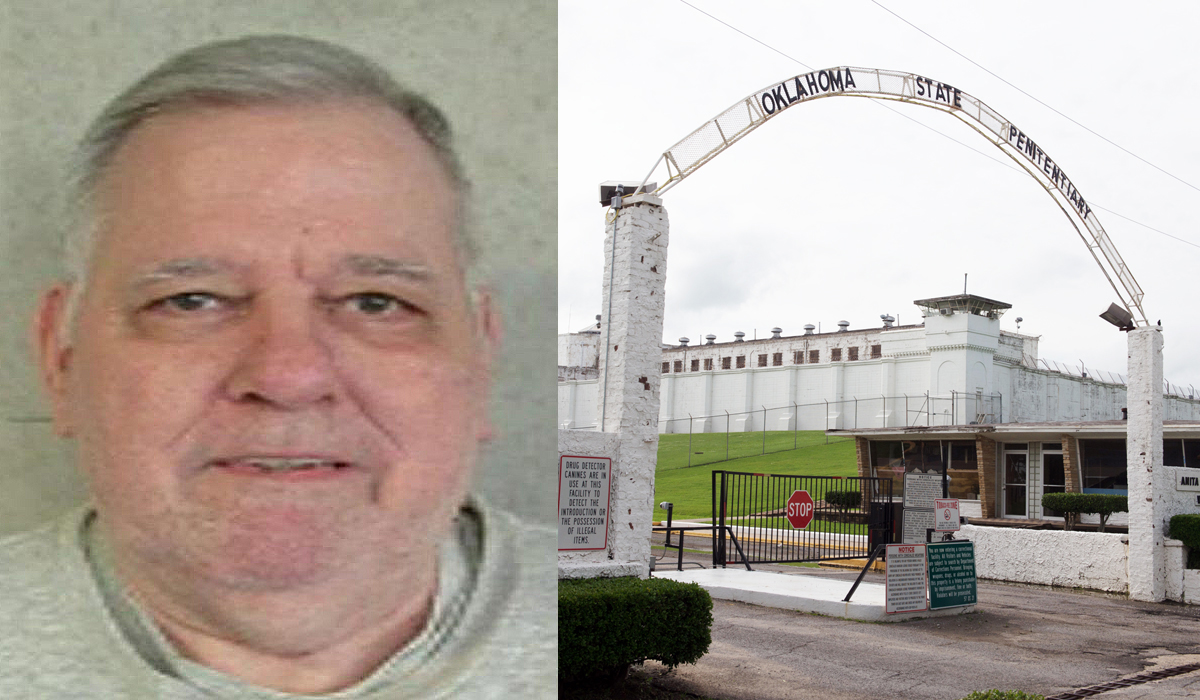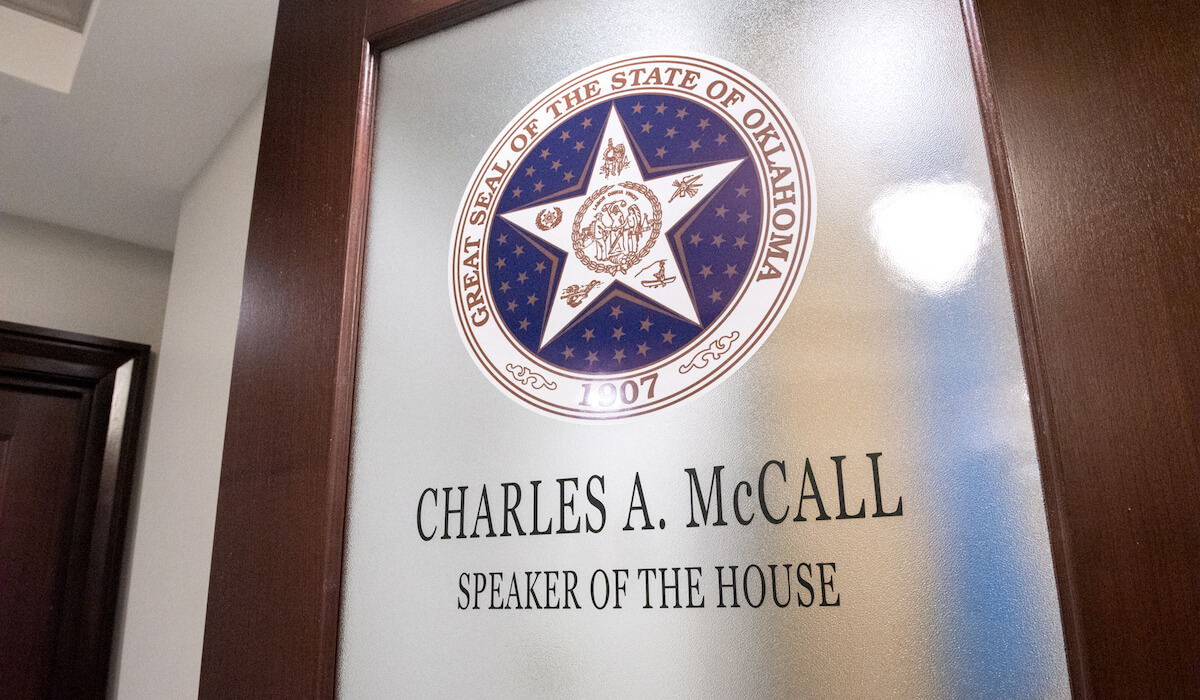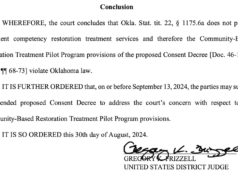
Former NonDoc intern Graham Dudley is now running two newspapers in western Oklahoma, and his office happened to land a pair of free Thunder tickets by way of a radio contest this week.
In between discussing community journalism and who would be the next head coach of OU football, I was reminded that Graham spent a chunk of his 2016 internship compiling our Monday “Filter” posts, which attempted to sift through the prior week’s headlines and present a smorgasbord of serious and ridiculous news nuggets, ideally with a catchy and insightful paragraphs at the start.
The Filter never quite took off in that manner, and we now use the category on our site mostly to tag internal developments or specific pieces about the media landscape. Still, I’d like to think Graham learned a few things during his time at NonDoc, and his community journalism work as editor of the Watonga Republican and Hinton Record bears following, particularly his coverage of this year’s Watonga police chief drama.
Wednesday night, as we downed some severely mediocre concession items and talked big city and small town basketball, Drake wandered into the arena and made news by being congenial. I tried to have some fun with the celebrity sighting on Twitter:
No, we won’t.
— NonDoc (@nondocmedia) December 2, 2021
In honor of Graham’s work as our first editorial intern — and because so much stuff happened toward the end of last week — the following offers a Filter redux that includes nuggets you might have missed about Oklahoma government and whatnot.
Stitt denies clemency for Bigler Stouffer

Late Friday afternoon, Oklahoma Gov. Kevin Stitt announced his decision to reject the Pardon and Parole Board’s recommendation of clemency for death-row inmate Bigler Stouffer, who claims he is innocent of a 1985 murder.
Stitt’s office did not include a quote from the governor in its brief press release:
After reviewing materials presented by all sides of the case, Governor Kevin Stitt has denied the Pardon and Parole Board’s clemency recommendation for Bigler Jobe Stouffer II.
A jury convicted Stouffer of first-degree murder and sentenced him to death for fatally shooting Putnam City school teacher Linda Reaves in 1985 and for the related attempted murder of Doug Ivens.
His execution is scheduled for 10 a.m. on Dec. 9 at the Oklahoma State Penitentiary in McAlester.
On Nov. 17, the Pardon and Parole Board recommended Stouffer be commuted to a life without the possibility of parole sentence, with board member Larry Morris questioning the safety of Oklahoma’s execution protocols.
On Nov. 18, Stitt commuted the death sentence of Julius Jones to life in prison without the possibility of parole.
On Nov. 30 and Dec. 1, the Pardon and Parole Board voted to deny the clemency petitions of Donald Grant and Gilbert Postelle.
Watch your Oklahoma Natural Gas bills
With dipping temperatures this week, customers of Oklahoma Natural Gas may want to check out a pair of hot headlines.
On Dec. 1, the Corporation Commission announced a settlement with ONG to approve $15.25 million of the company’s requested rate increase. However, the commission also ordered ONG to reduce the impact of the rate increase by applying a $10.6 million tax credit from the Tax Cuts and Jobs Act of 2017.
OCC flack Matt Skinner summed things up in a press release:
The Oklahoma Corporation Commission has approved a settlement agreement which will initially result in an average increase of $1.27 in the average residential bill. However, the settlement includes a Commission order that requires ONG to apply a $10.6 million tax credit received under the Tax Cuts and Jobs Act of 2017 to the rates in question. That credit will be applied in February of 2022, lowering the overall increase to 34 cents a month for the average residential customer on an annualized basis.
Meanwhile, ONG’s proposal for securitization of its $1.37 billion in winter storm debt is still pending. Some, including the AARP, are criticizing the company’s proposal for what would be an unusual $687.50 service “exit fee.”
Dale Denwalt of The Oklahoman summarized the issue thoroughly:
During the winter storm, ONG was forced to buy from a wildly reactive market to meet customer demand. Comparatively, ONG spent just $222 million buying natural gas during all of 2020.
As one regulator put it, “decisions were being made during that storm to literally keep people alive.”
That comment was made during a recent Oklahoma Corporation Commission hearing where OCC Public Utilities Division Director Brandy Wreath presented details of the agreement. Final approval is now up to Oklahoma’s three elected corporation commissioners.
According to the plan, ONG would pay its immediate debt by issuing bonds to investors. Customers would be on the hook to gradually repay those bonds over the next 25 years. To make the investment more attractive, the plan’s designers created an “exit fee” to ensure the entire amount due would be paid, even if a customer switches their home’s fuel source.
AARP Oklahoma Director Sean Voskuhl opposes the cost-recovery plan entirely and the “exit fee” specifically:
“ONG is not only charging everyone the same flat fee whether they live in a mansion or a studio apartment, but they are also trying to lock them into a lifetime agreement of which the only way out is to pay a ransom. This is no way to treat customers,” Voskuhl said.
The future of hydrogen energy in Oklahoma

Speaking of energy, the Oklahoma Hydrogen Production, Transportation and Infrastructure Task Force released its statutorily required report Dec. 1.
Weighing in at 112 pages, the document is replete with maps and group photos featuring lawmakers and state employees posing in front of things. (Task force members visited Germany and other places to learn about the hydrogen energy industry.) A mistype on the report’s cover page emphasizes the longterm goal of producing hydrogen fuel in Oklahoma.
The task force’s “conclusion” begins on Page 53 and says Oklahoma’s assets provide a “strong platform from which to produce low-cost hydrogen supporting our state’s economy and environment through both in-state applications and for export across the U.S.”
The section continues:
Legislators, regulators and permitting agencies should review and augment as necessary existing rules and laws to provide transparent pathways for developers and investors interested in the Oklahoma hydrogen economy. Our focus on a business-friendly environment for hydrogen stakeholders will complement activities involving the federal funding for hydrogen hub infrastructure activities.
Policymakers should consider the creation of a hydrogen collaborative of interested stakeholders and solidify a required annual reporting of progress, developments, and updates to executive leadership at the Capitol. Hydrogen will likely develop in a measured fashion, and it is important to maintain momentum as first movers may hold an overall advantage in the decades to come.
Oklahoma is home for numerous hydrogen industrial companies which can be leveraged and grow this industry into the critical mass necessary for a resilient economy. Initially focusing on heavy-duty trucking to provide the base demand for hydrogen fuel will lead to expansion into other market segments such as blending H2 into a natural gas-powered turbine for power generation.
To learn more about why Oklahoma Secretary of Energy Ken Wagner has a goal to recruit more than $1 billion of investment into hydrogen energy, read this NonDoc article from May.
State, feds in court over mining jurisdiction

Attorneys for the U.S. Department of the Interior and the state of Oklahoma appeared before federal Judge Stephen Friot on Thursday regarding the jurisdiction of surface mining regulation in eastern Oklahoma.
Attorney General John O’Connor sued the federal agency after it published a notice in May that the state of Oklahoma no longer has jurisdiction under the Surface Mining Control and Reclamation Act of 1977 for land within eastern Oklahoma’s newly affirmed Indian Country reservations.
After hearing arguments Thursday from both parties, Friot took Oklahoma’s request for injuction under advisement and asked the state’s attorneys to submit a brief regarding the definition of “reservation.”
Generally speaking, the state argues that the U.S. Supreme Court decision in McGirt v. Oklahoma only affirmed the Muscogee Nation Reservation for purposes of the Major Crimes Act. President Joe Biden’s administration says the state is no longer in charge of regulating coal and other mining operations within the tribal boundaries of the Muscogee, Cherokee, Chickasaw, Choctaw, Seminole and Quapaw nations.
To review background on the surface mining jurisdiction issue, read NonDoc’s article from June about the federal agency’s notice.
Halfway to more special session

Although they just completed a November special session for the purpose of redistricting legislative and congressional maps, the Republican Caucus of the Oklahoma House of Representatives supports another special session for some sort of action aimed at halting President Joe Biden’s vaccine mandates.
A federal judge in Louisiana granted an injunction blocking Biden’s vaccine mandate for health workers last week, and the Biden administration’s vaccine-or-test Occupational Safety & Health Administration mandate for certain private businesses is also in appellate court.
Still, House Speaker Charles McCall (R-Atoka) closed out his Friday with a press release proclaiming his caucus’ support for a special session on the issue “at any time.”
“President Biden’s unconstitutional vaccine mandates are already under court injunctions secured by House Bill 1236 legal challenges,” McCall said. “The injunctions are positive developments, but they are not permanent protections for Oklahomans being forced to choose between their freedom or their jobs. Just as House Republicans led to enact House Bill 1236, we stand ready at any time to fight overreaching federal vaccine mandates via legislation in a special session. House Republicans support securing freedom for Oklahomans immediately.”
The one-chamber press release would seem to indicate that the State Senate’s Republican Caucus has not come to the same conclusion so far.
The 2022 regular session is scheduled to begin Monday, Feb. 7, which would be after the original mandate implementation schedule.
Quote of the week
“You probably shouldn’t wear a USC tie, either.”
— OU Board of Regents Chairman Michael Cawley joking with Rogers State University President Larry Rice on Thursday, Dec. 2.
Video of the week
If you need something to distract you for seven hours of your brutal Monday, check out this video of the 2021 Choctaw Nation pow wow, held this weekend at the Choctaw Event Center in Durant.
(Update: This article was updated at 11:30 p.m. Wednesday, Dec. 8, to reflect a correction to The Oklahoman article regarding the price of the proposed service exit fee.)





















